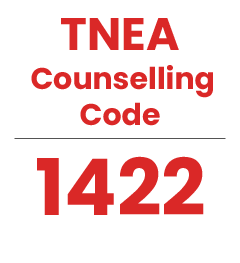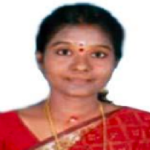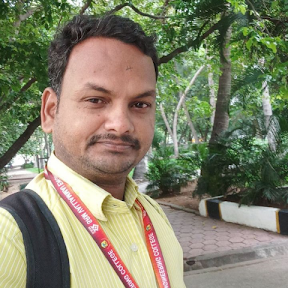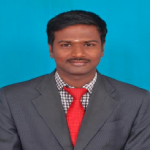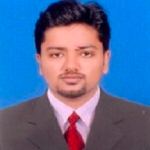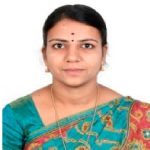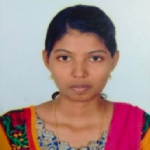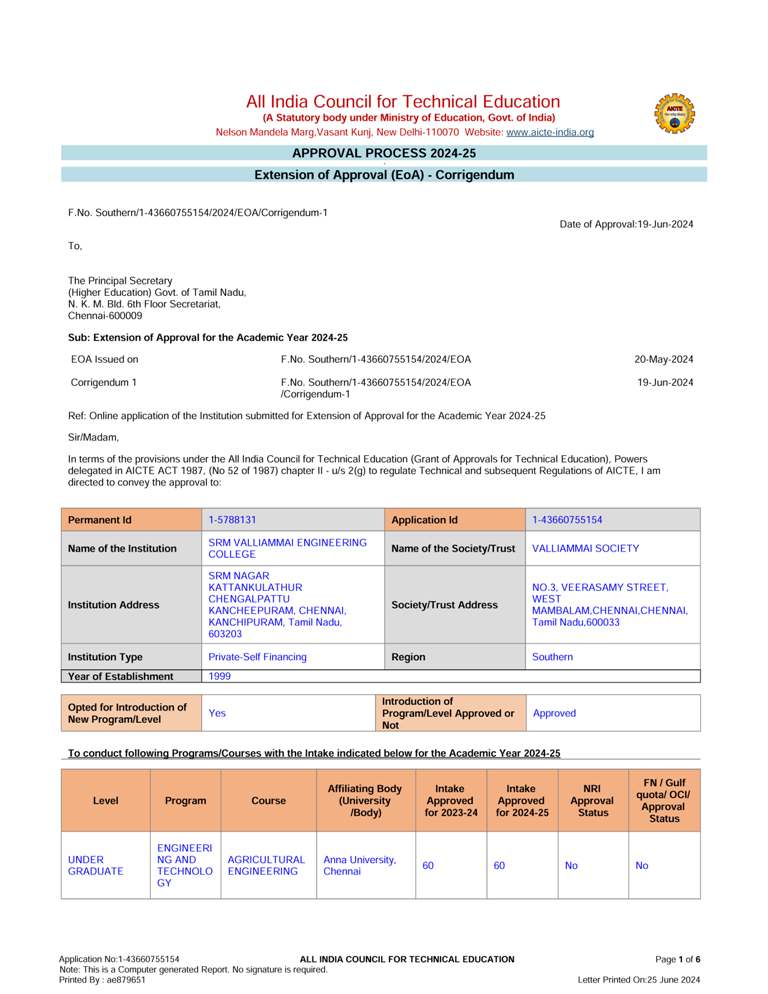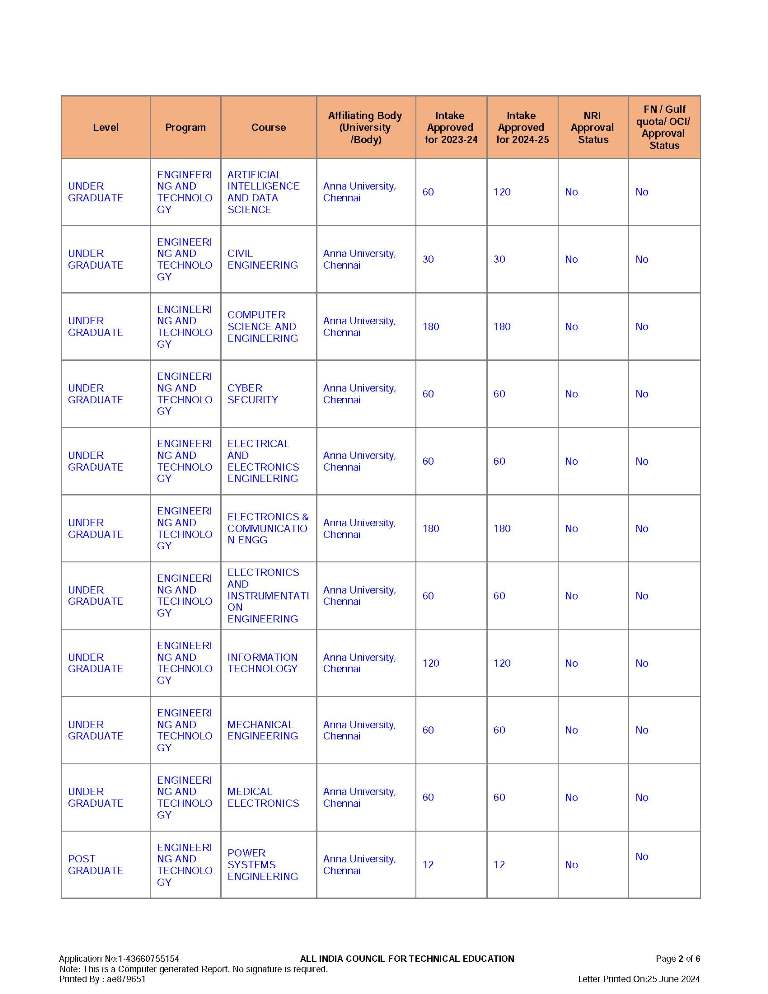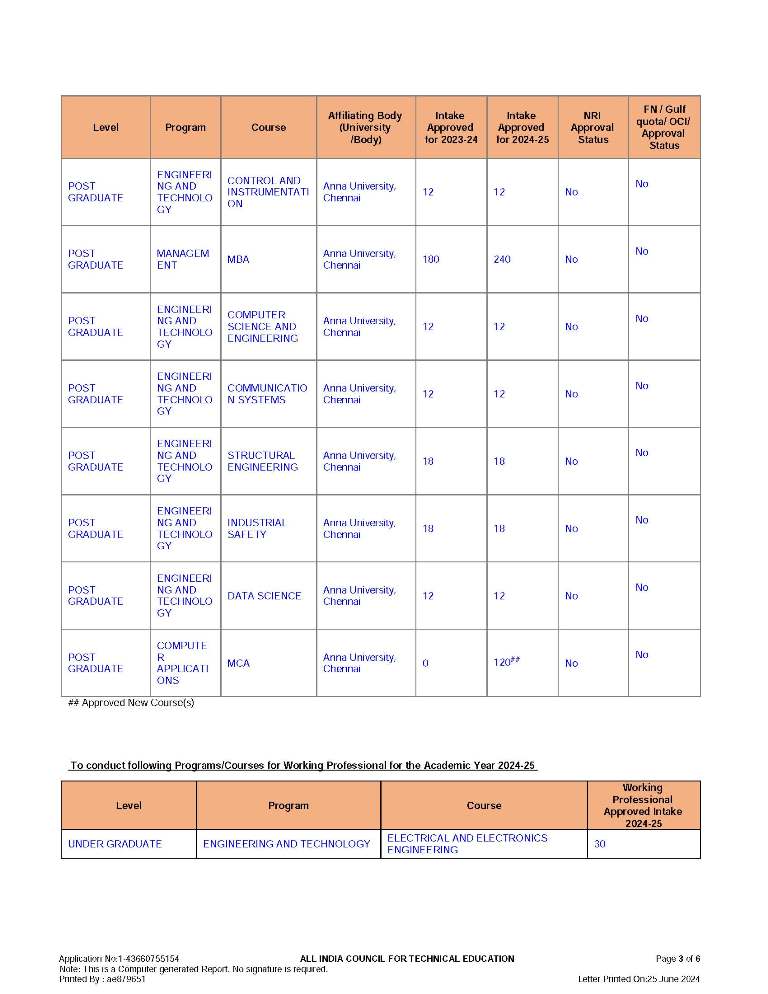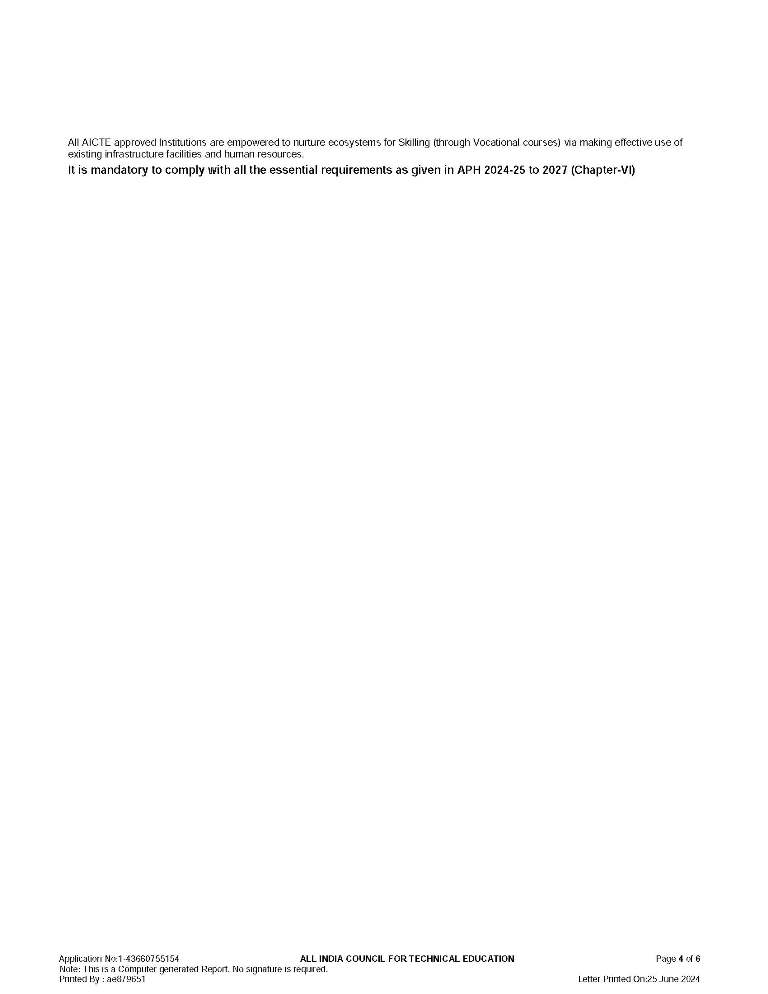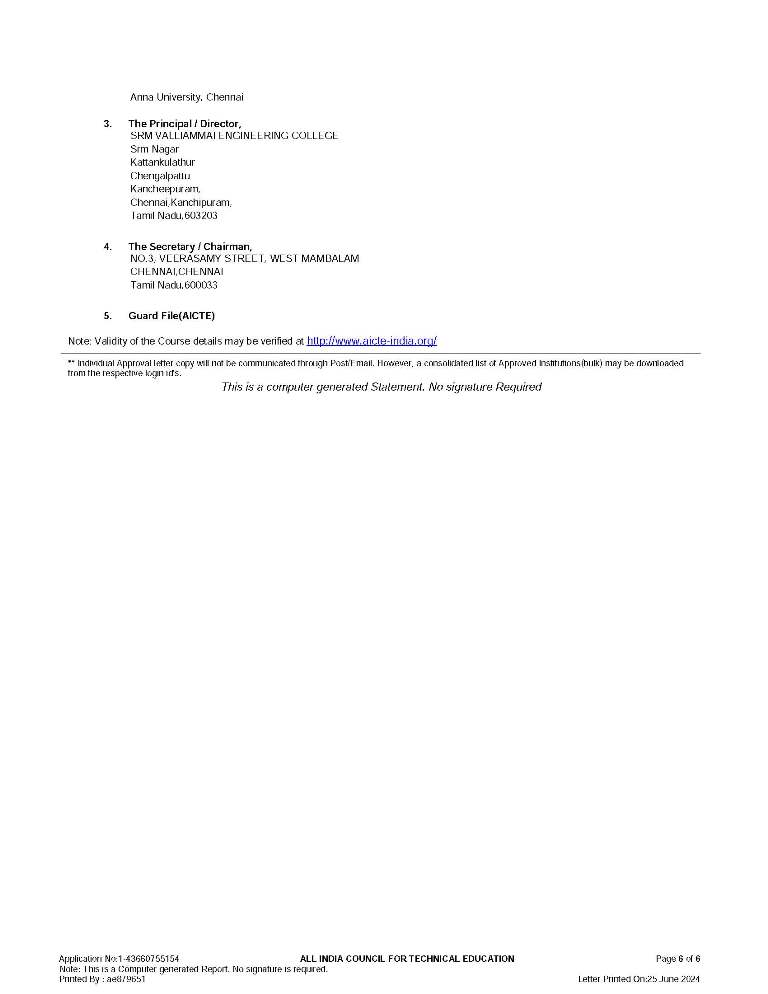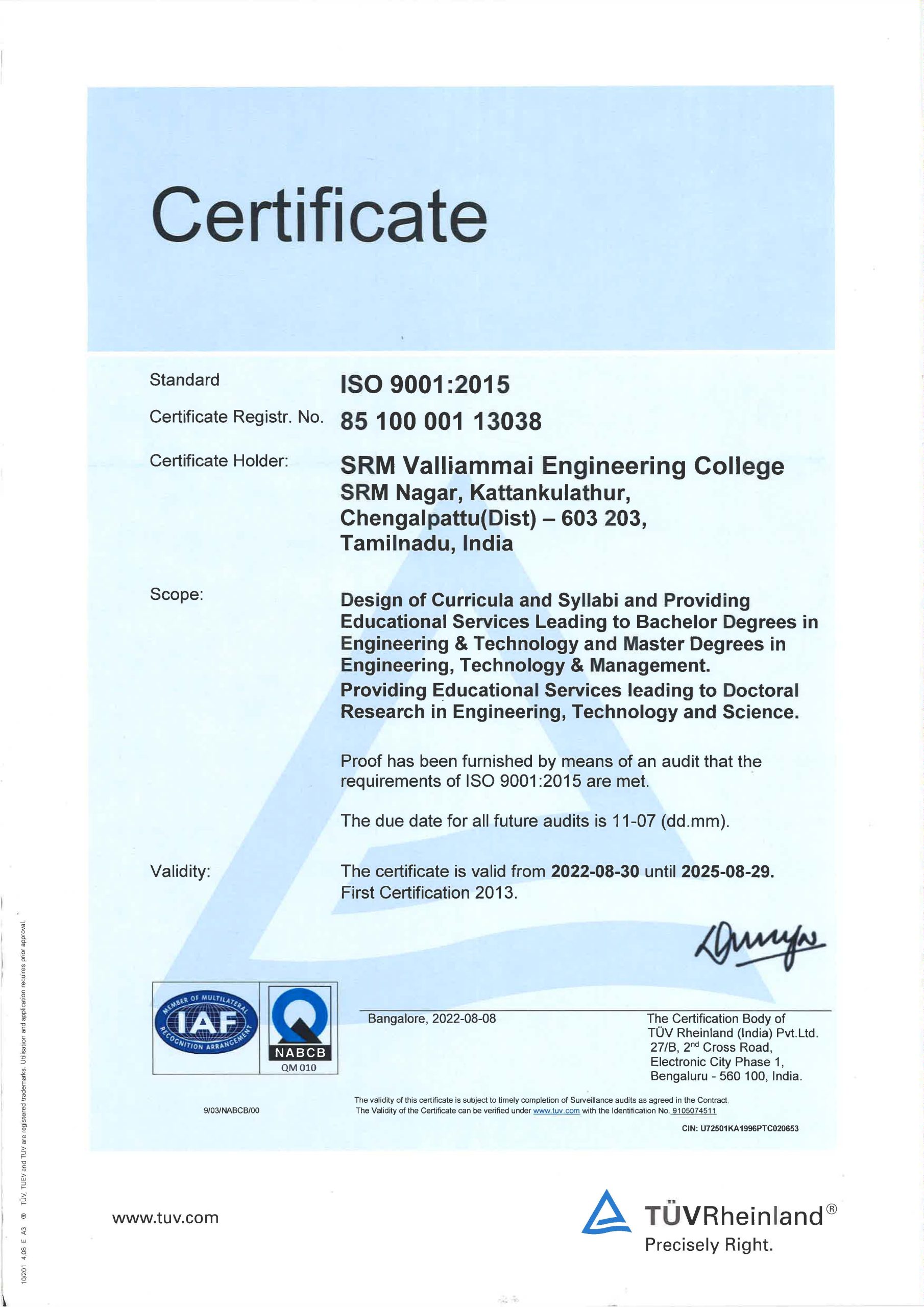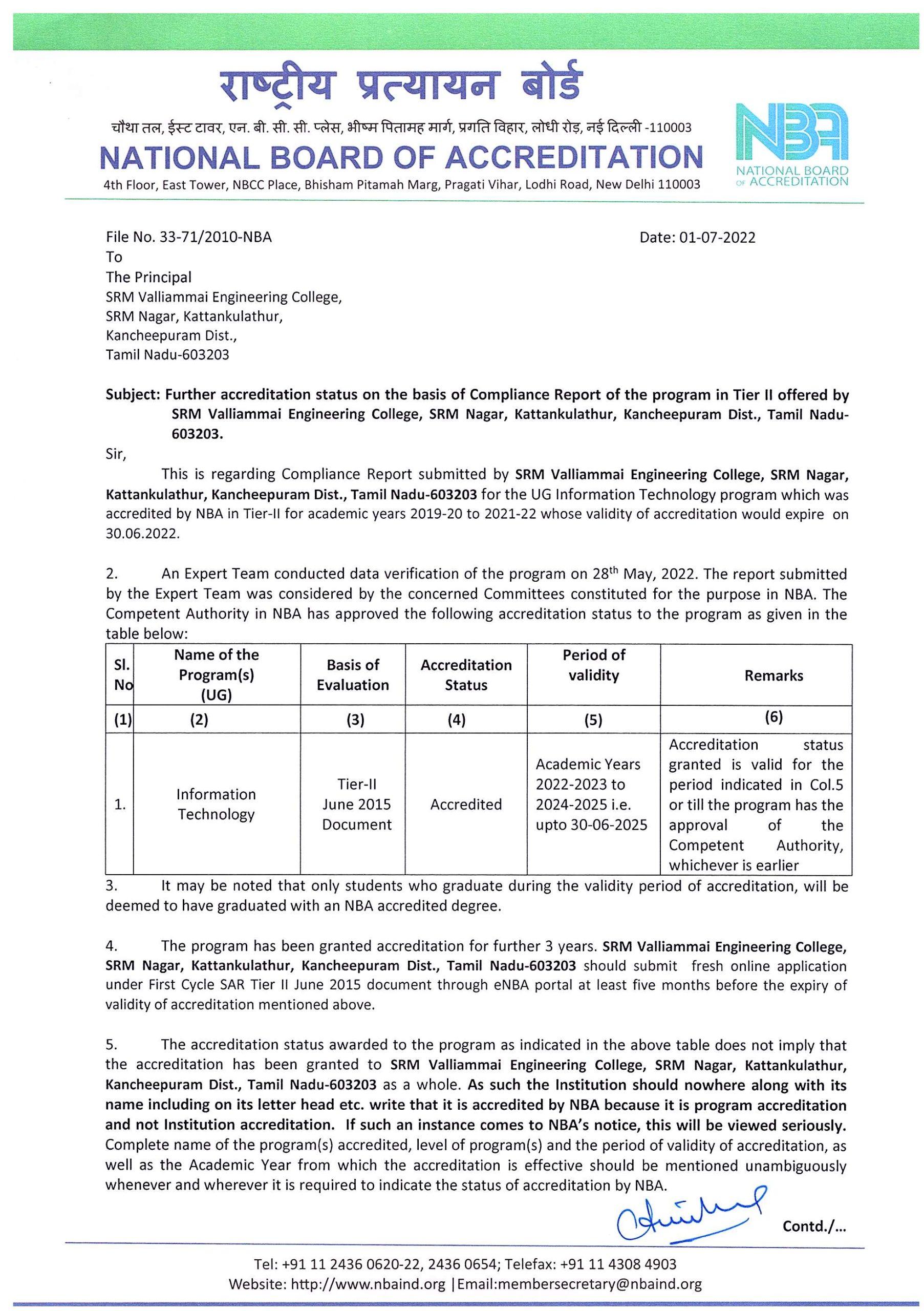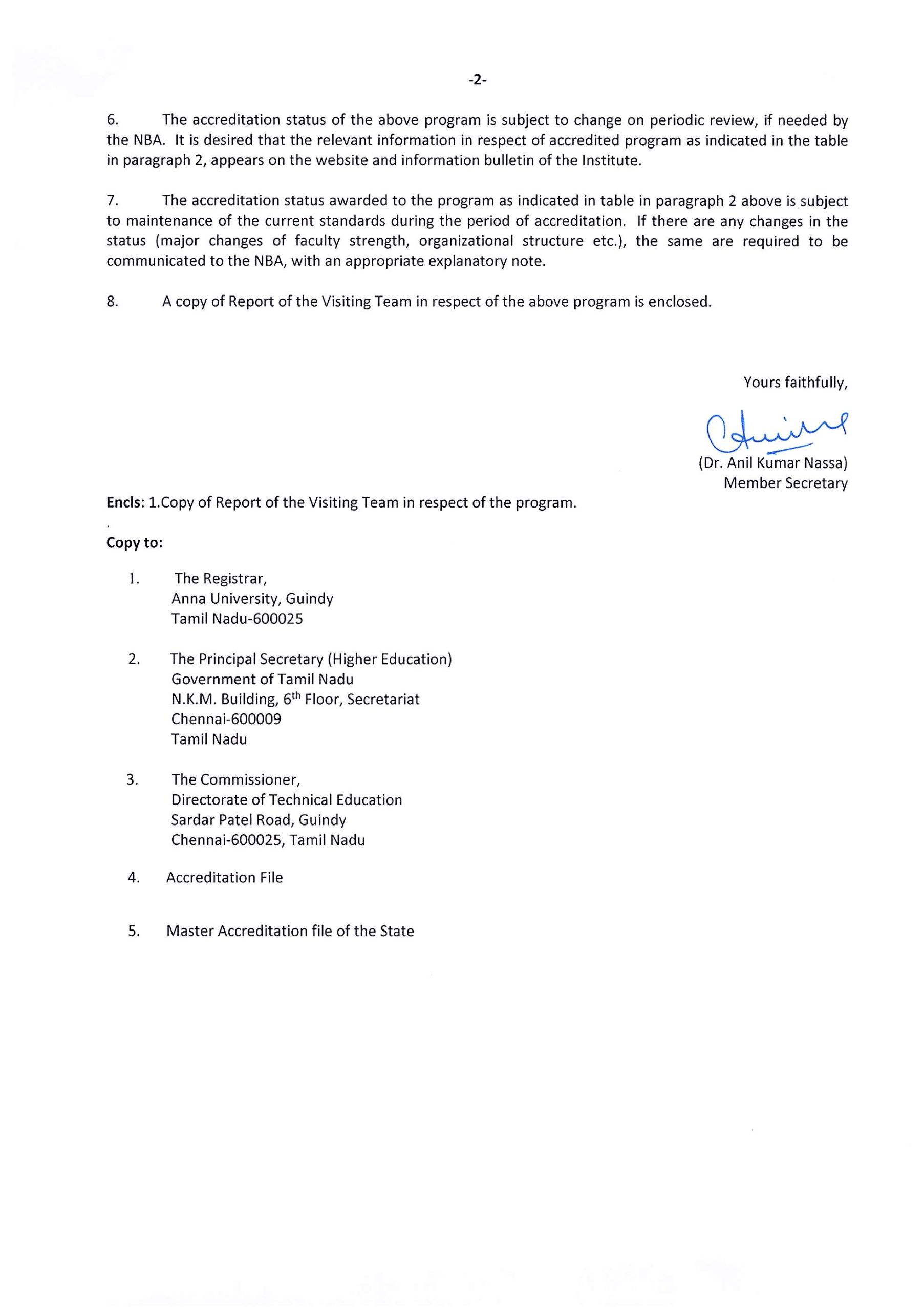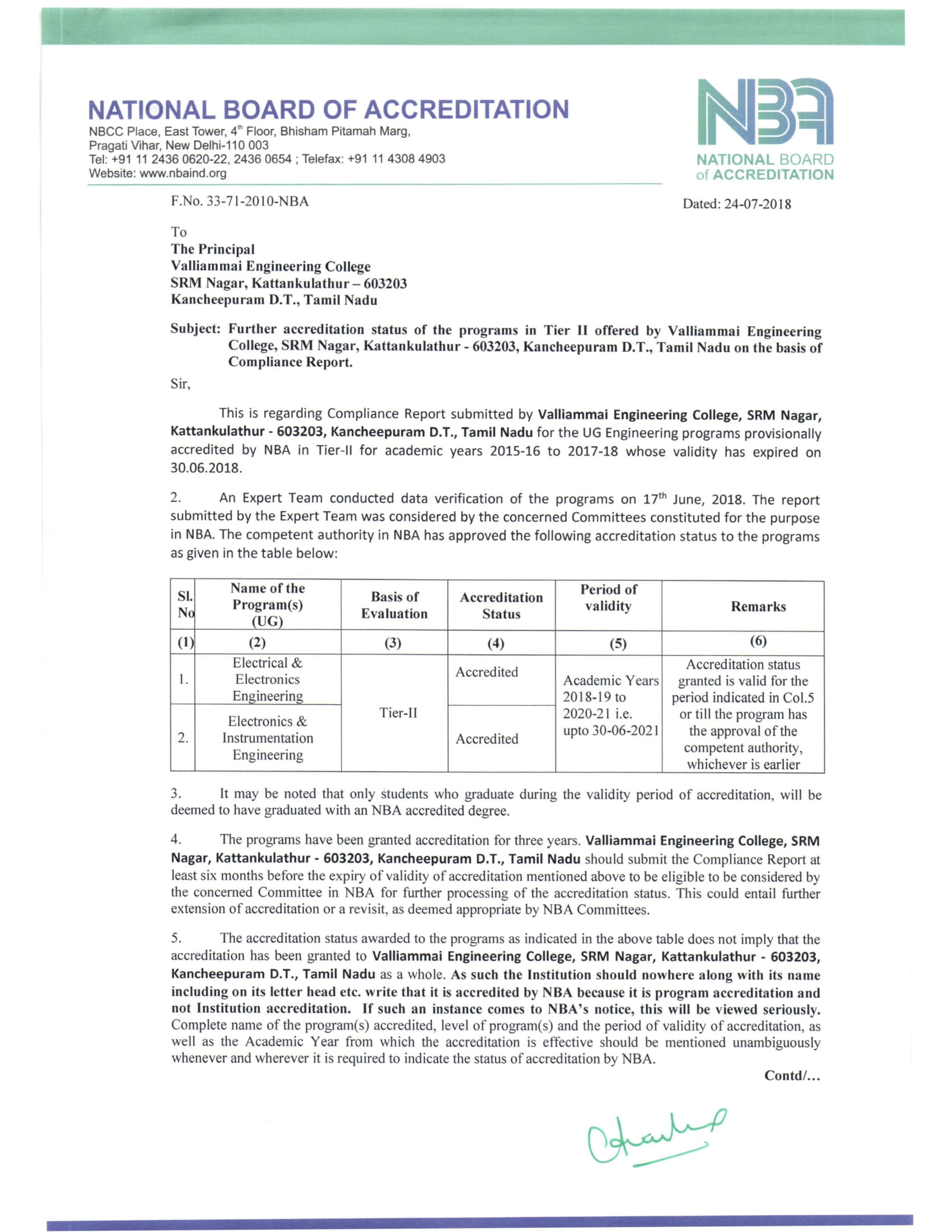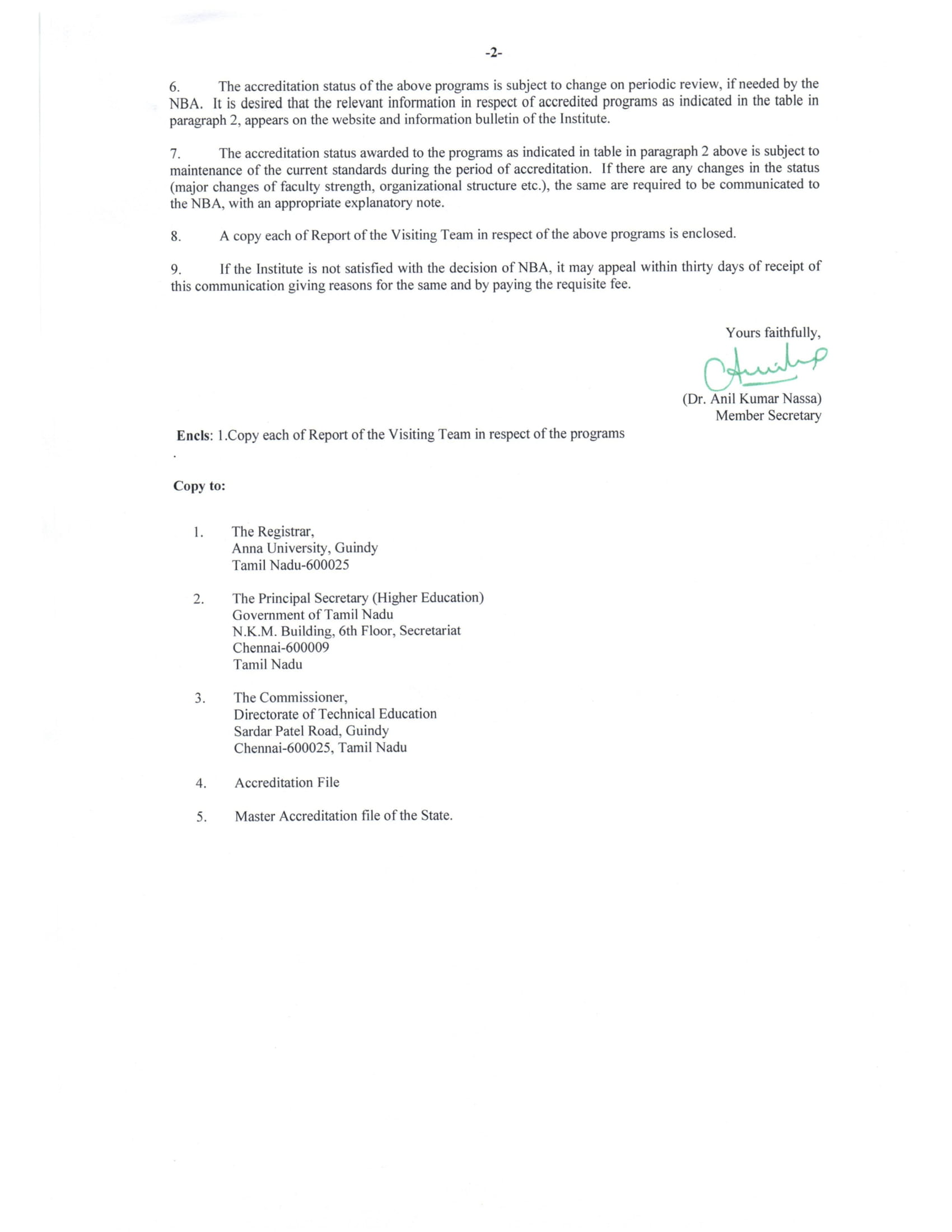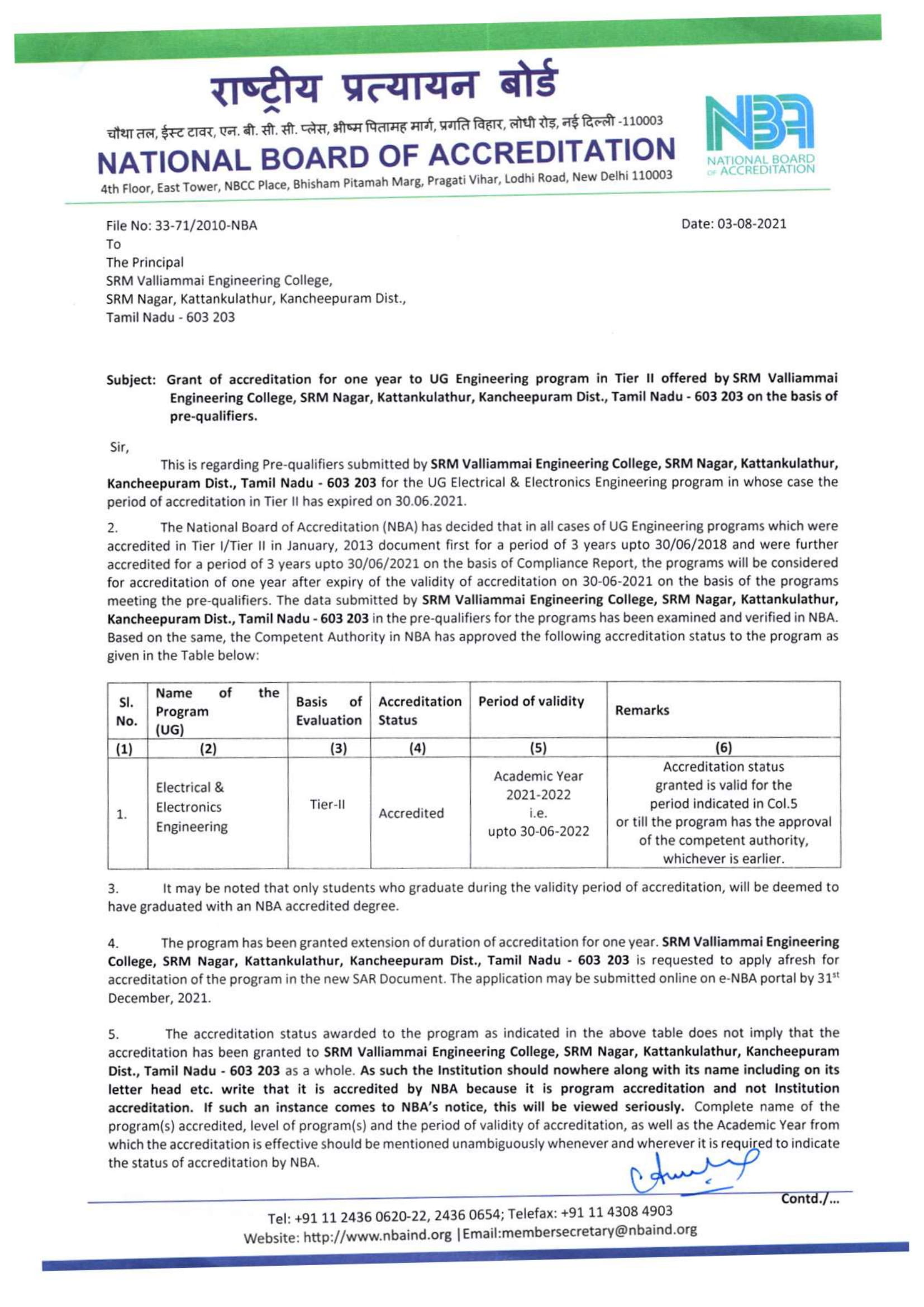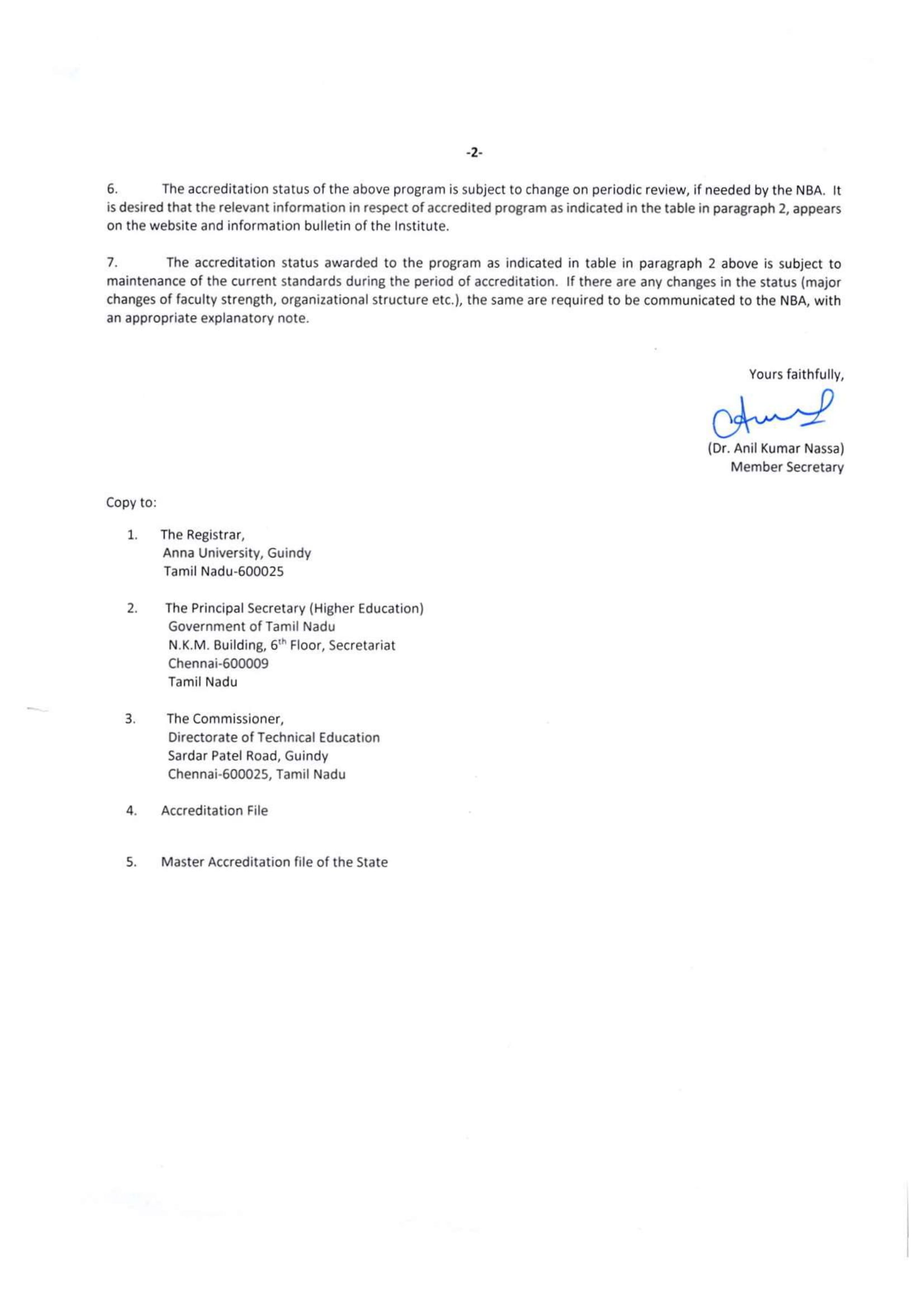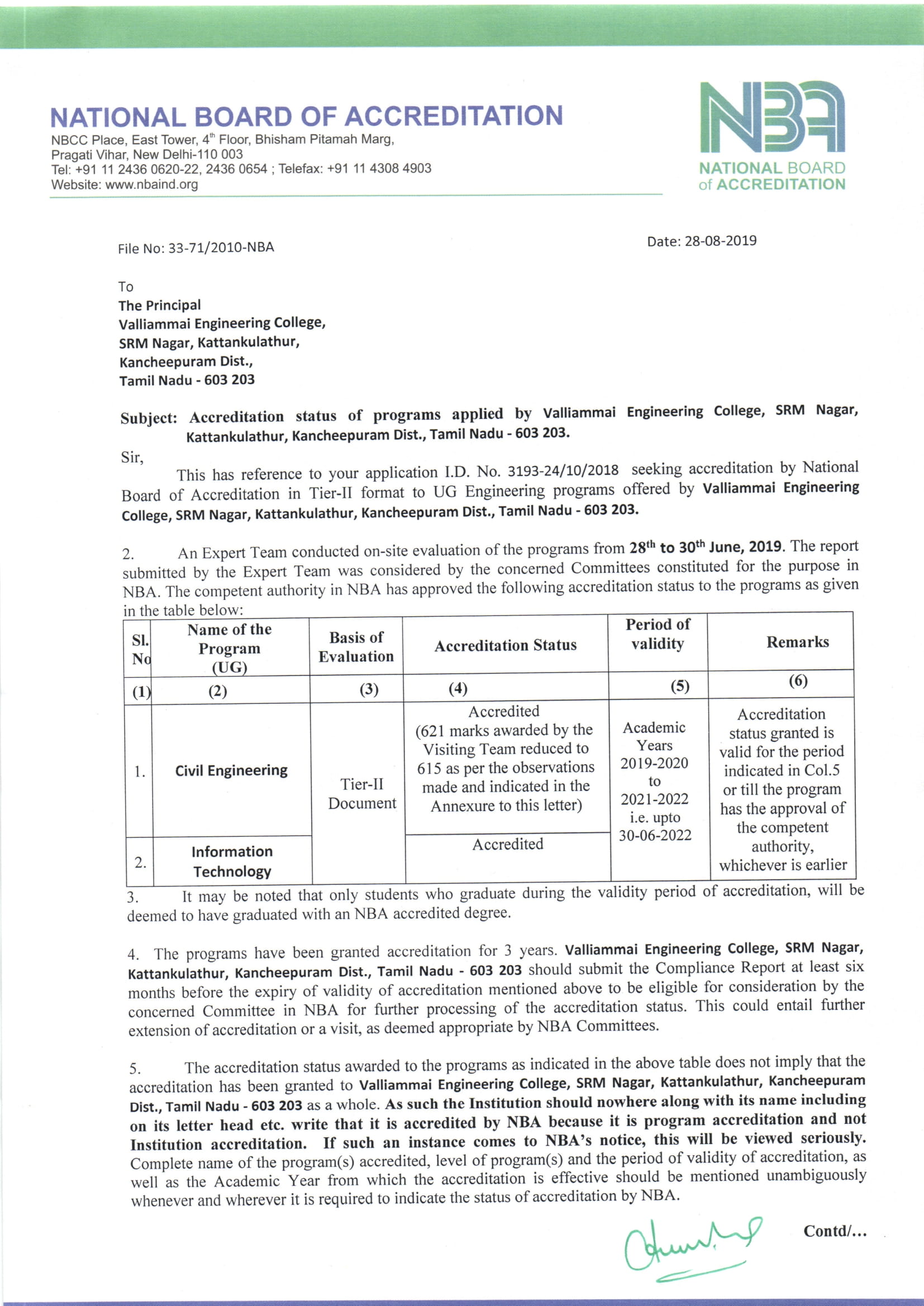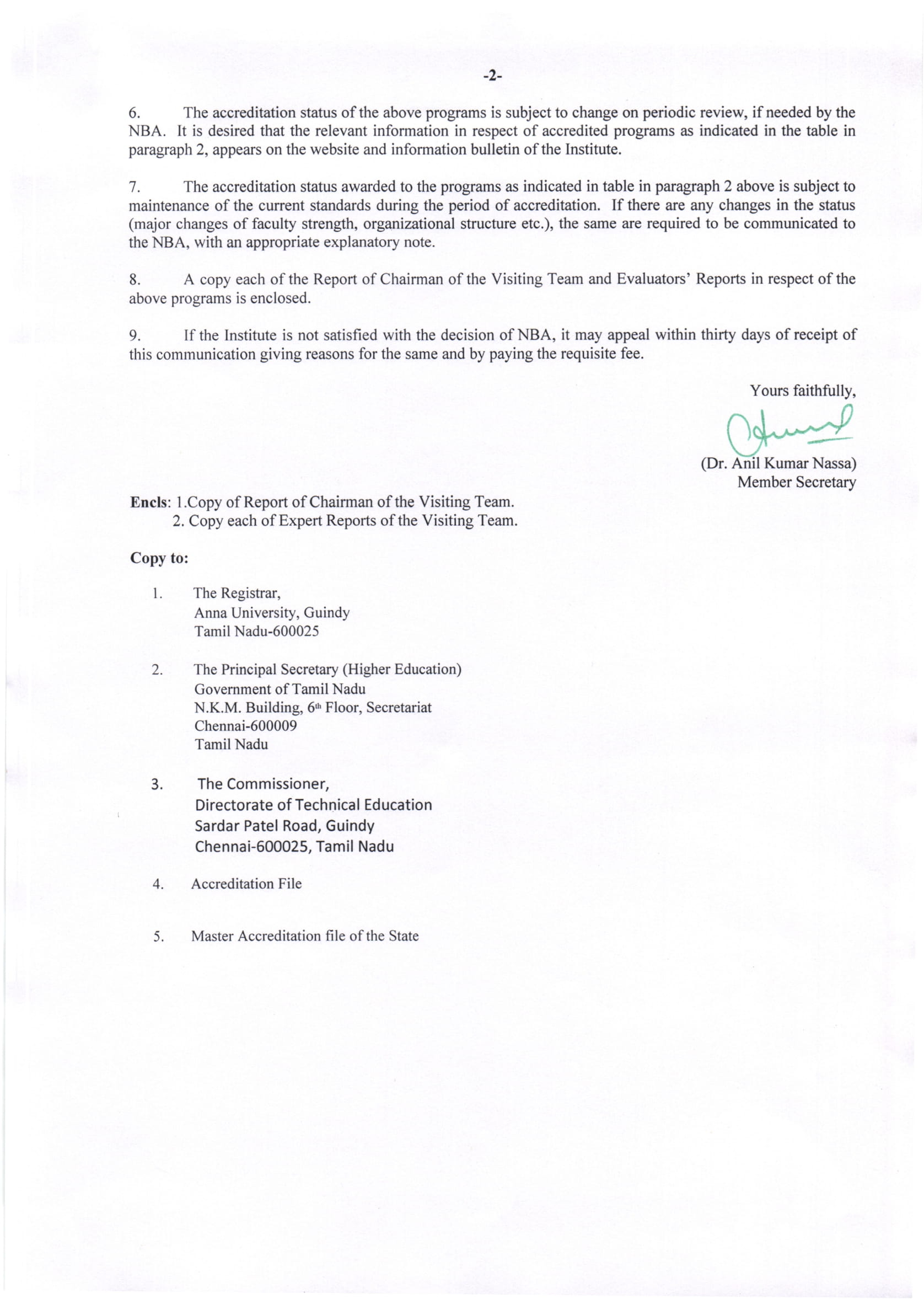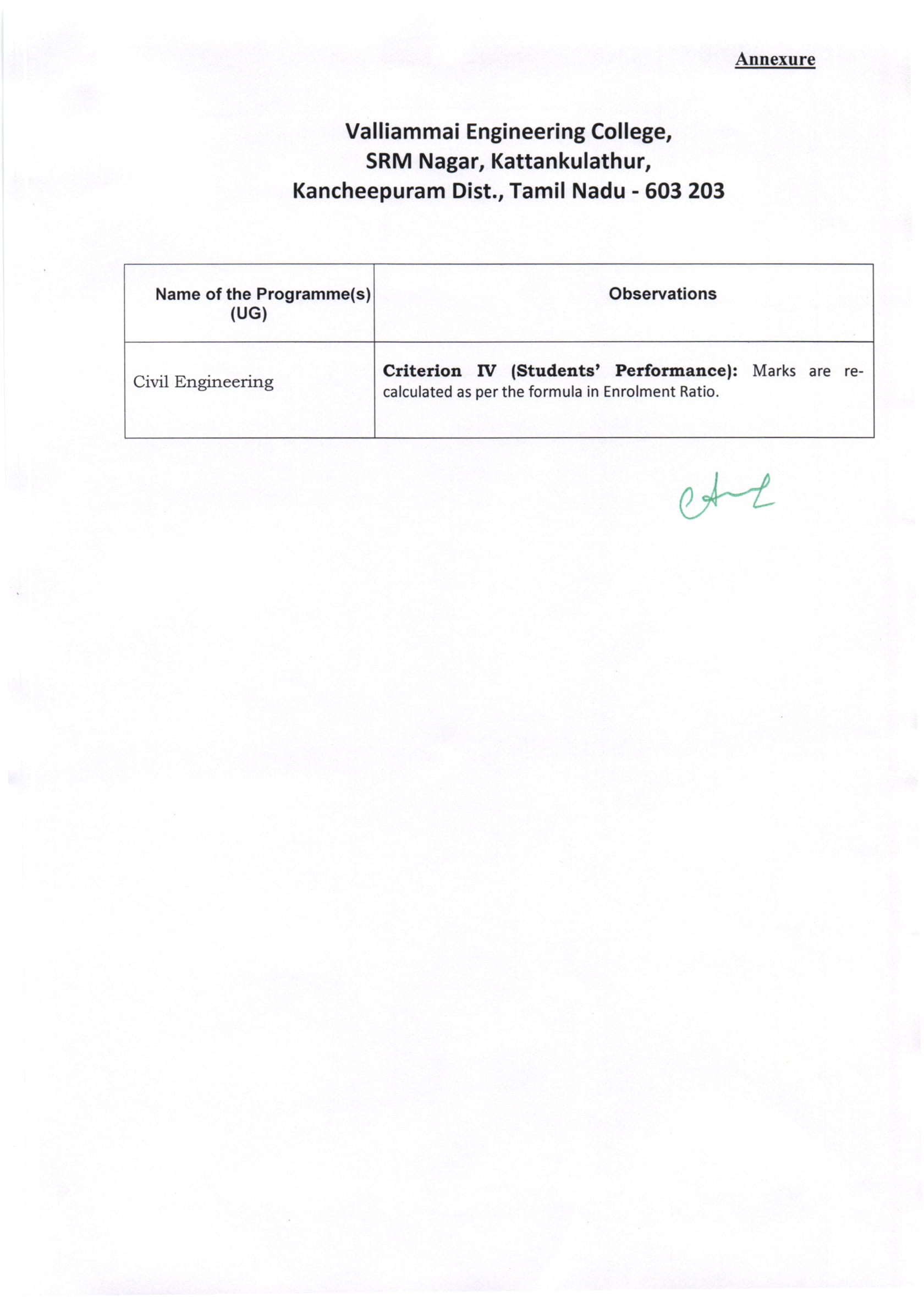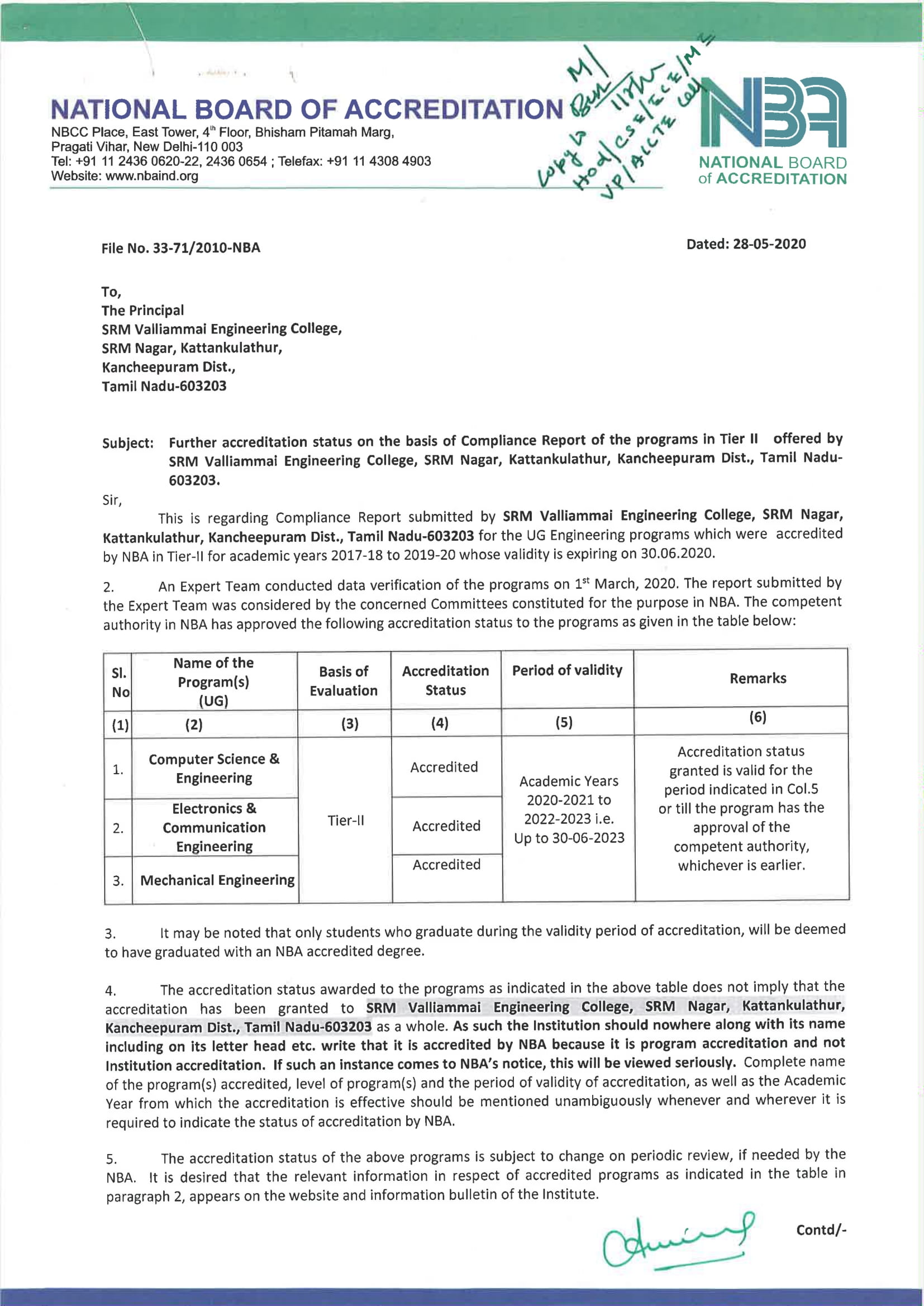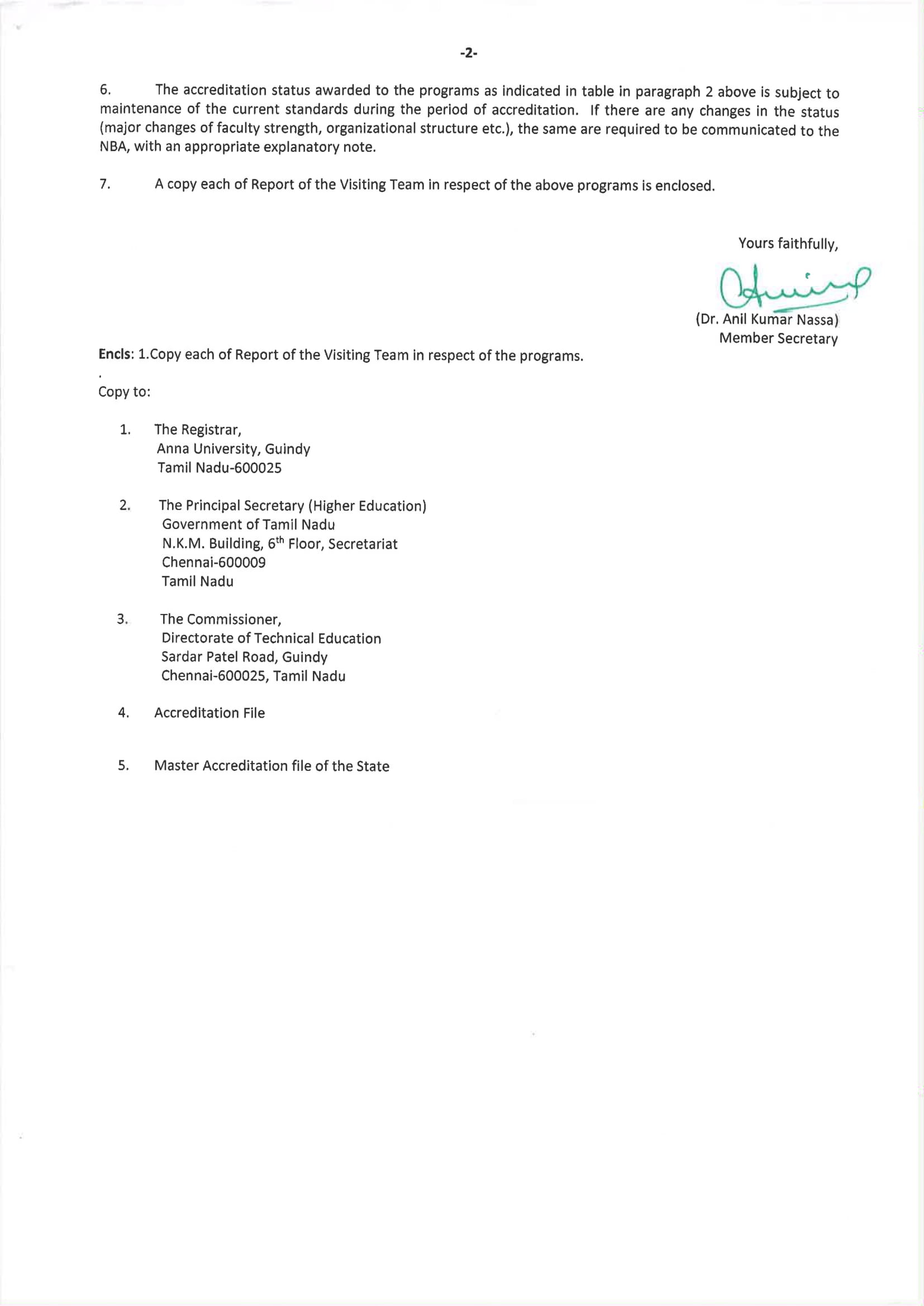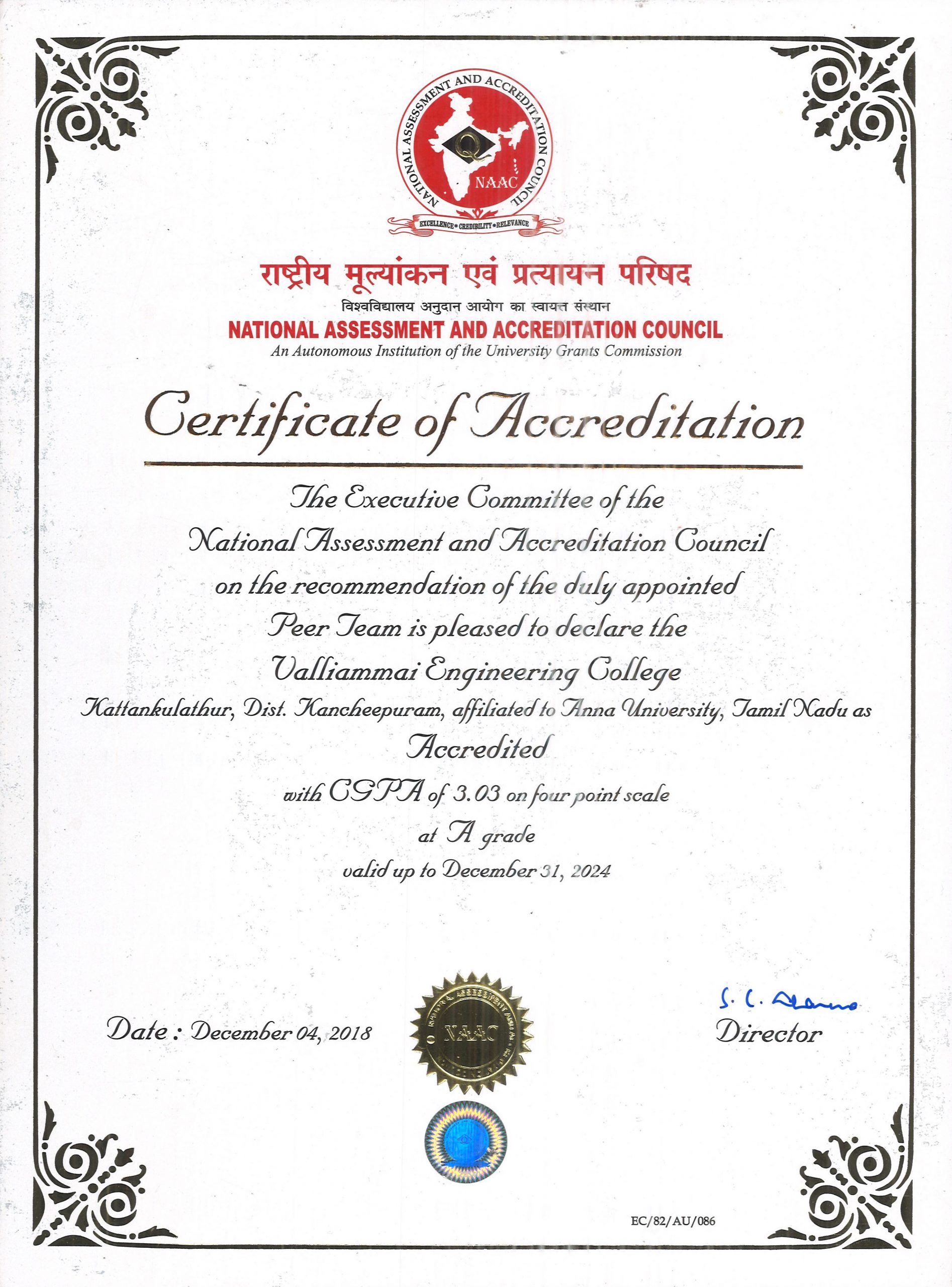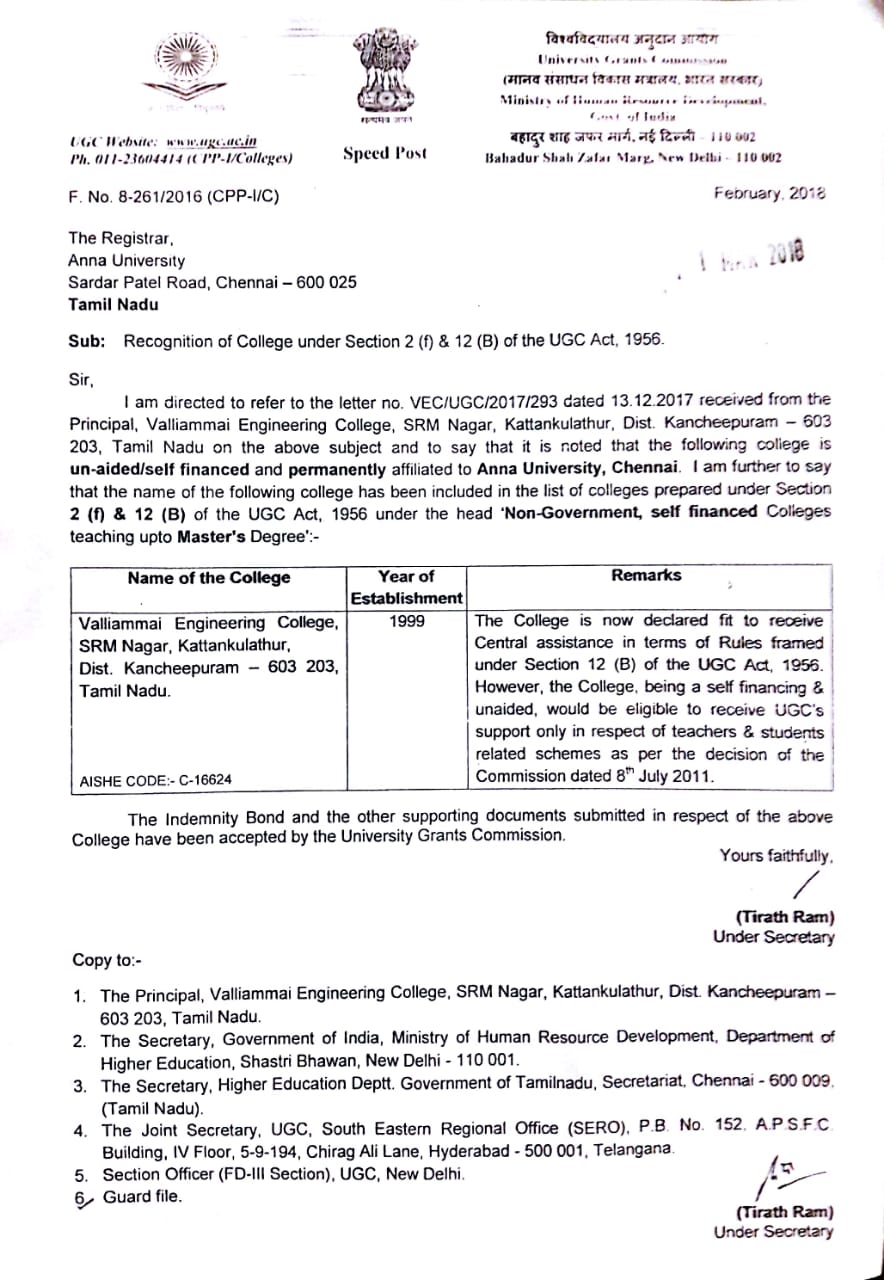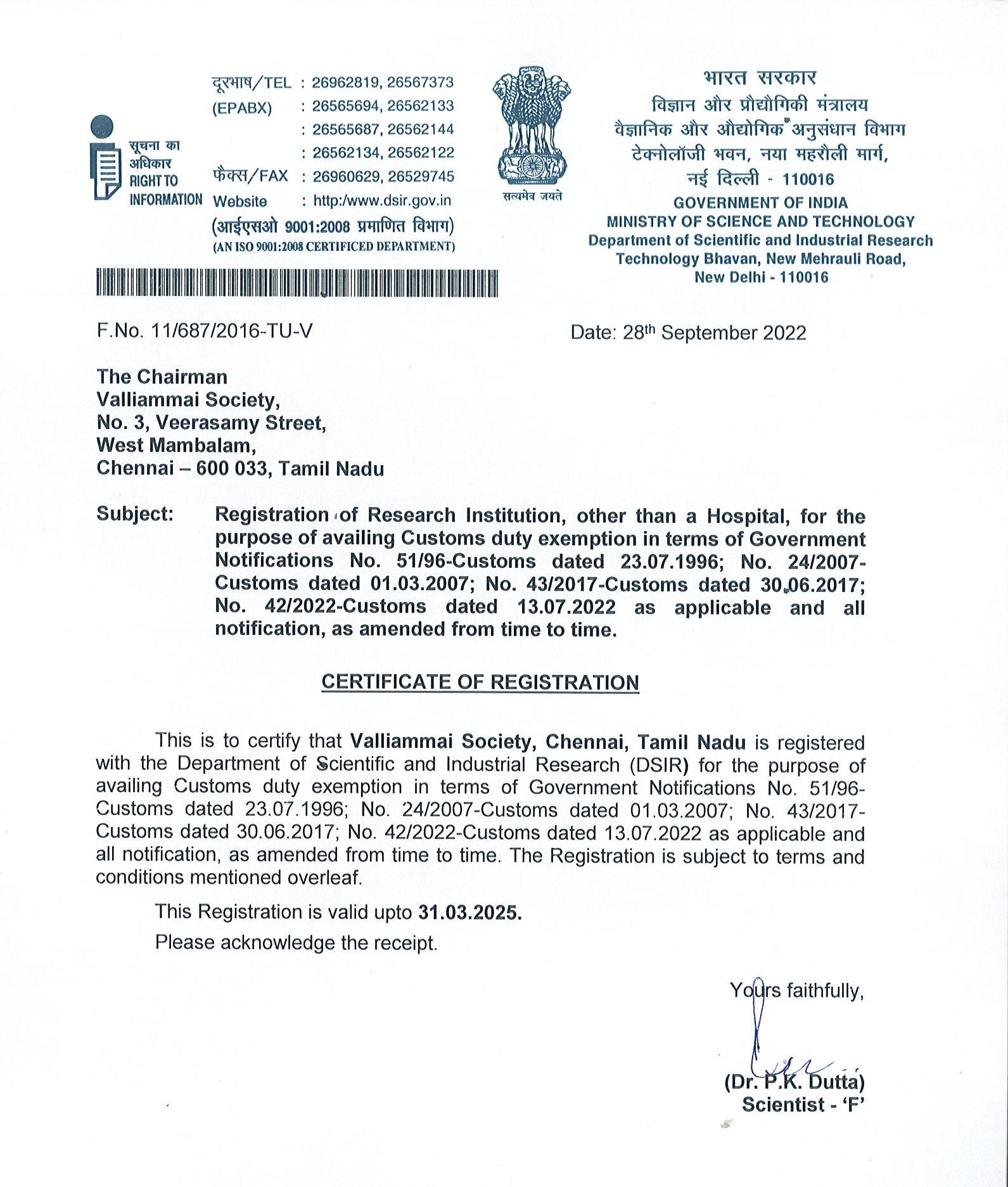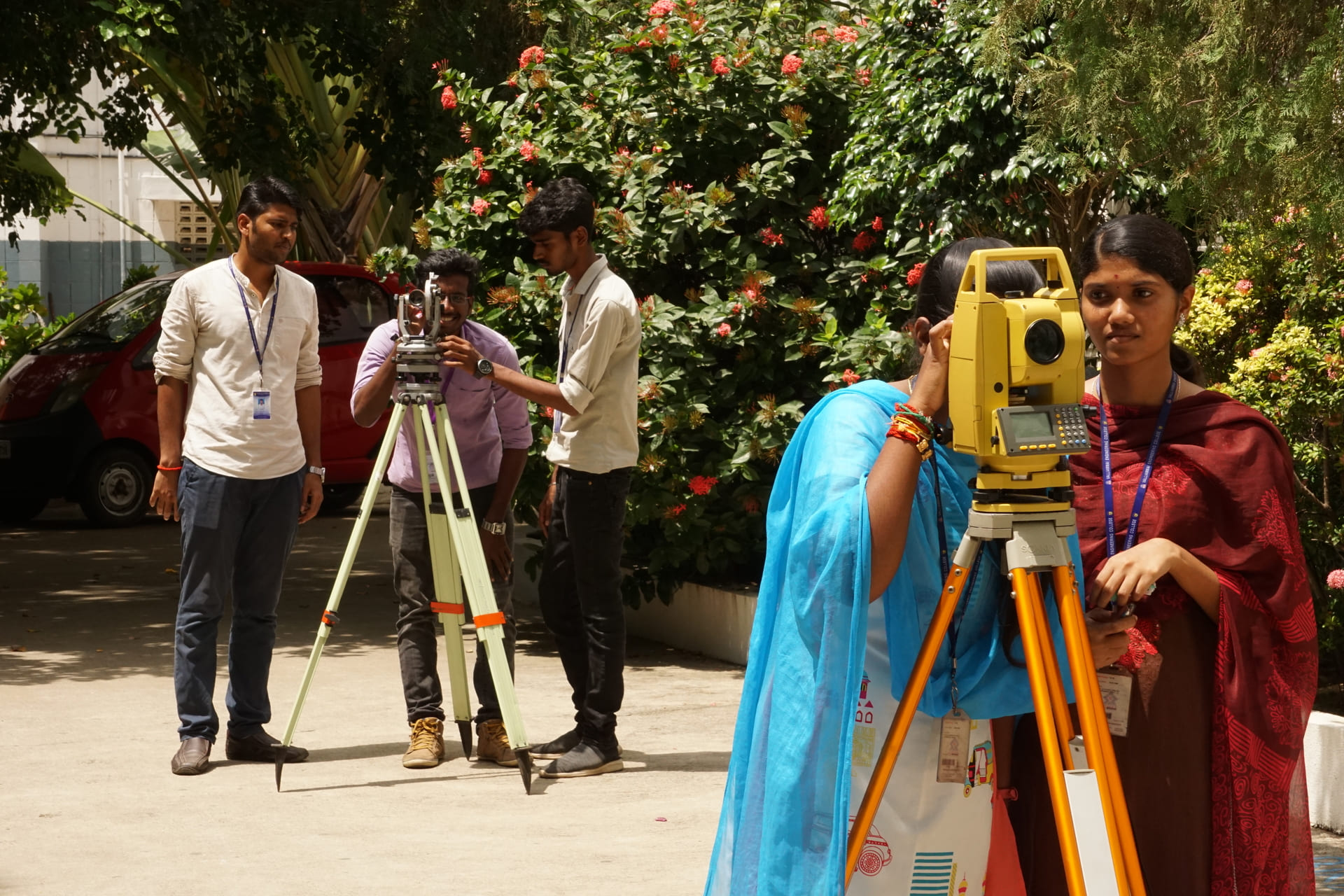

About the Department
Department Of Civil Engineering
The Department of Civil Engineering was incepted in 2009 to impart quality education to the Engineering students in the field of Civil Engineering. Initially, the annual intake was 60. In tune with the growing demand profile globally for Civil Engineering, the intake level was enhanced to 180 in 2013 – 2014 and the Department also offers M.E.-Structural Engineering from the Academic year 2013-14 onwards.
Right from its inception, the Department has steadily grown in all spheres in terms of
- Student strength, physical Infrastructure, number of labs – subject wise, as per the rapid upgradations introduced by the AICTE in the recent times and progressive changes in syllabi of Anna University.
- Central and Department Library, number of systems in the labs, requisite software, organization and establishment of in-house maintenance wing and its training.
- The Department has well-qualified and experienced Faculties with various specializations, relevant to the industry.
The Department strives to develop long term relationships with industries and market the student’s talents effectively. The students are thus provided with the high level ‘Leads and Pathways’ that enable them to gain access to a broad range of ‘high potential’ and ‘hi-tech’ career opportunities.
Programmes run by the department are,
- B.E.- Civil Engineering
- M.E.- Structural Engineering
B.E.-Civil Engineering is Accredited by National Board of Accreditation (NBA), New Delhi.
Vision, Mission, PEO, PO, PSO
Vision
To produce competent and quality engineers by imparting knowledge, excellence and global perspectives in Civil Engineering to our students and to make them ethically strong professional engineers to build our nation.
Mission
M1: To produce outstanding graduates with high technical knowledge to serve the nation.
M2: To impart value based education.
M3: To provide solution to the challenges in the field of Civil Engineering.
Programme Educational Objectives (Peo’s) :
PEO1: To produce graduates who can understand their ethical, environmental as well as professional responsibilities so that they appreciate the impact of the engineering solutions which have sustainability over society and the nation.
PEO2: To develop the graduates who will exhibit strong technical ability to create & synthesize data using relevant tools and concepts, for providing sustainable solutions to civil engineering problems and projects.
PEO3: To equip the graduates with suitable skills making them industry ready when they leave the portals of the Institute and to become a competent distinguished Professional Civil Engineer.
PEO4: To produce students who can exhibit attitude, professionalism, ability to communicate with team members and adapt to the latest technology by engaging themselves in life-long learning.
Programme Outcomes (Po’s) :
Engineering Graduates will be able to
- 1. Engineering knowledge:Apply the knowledge of mathematics, science, engineering fundamentals, and an engineering specialization to the solution of complex engineering problems.
- 2. Problem analysis:Identify, formulate, review research literature, and analyze complex engineering problems reaching substantiated conclusions using the first principles of mathematics, natural sciences, and engineering sciences.
- 3. Design/development of solutions: Design solutions for the complex engineering problems and design system components or processes that meet the specified needs with appropriate consideration for the public health and safety, and the cultural, societal, and environmental considerations.
- 4. Conduct investigations of complex problems: Use research-based knowledge and research methods including the design of experiments, analysis and interpretation of data, and the synthesis of the information to provide valid conclusions.
- 5. Modern tool usage: Create, select, and apply appropriate techniques, resources, and modern engineering and IT tools including prediction and modeling to complex engineering activities with an understanding of the limitations.
- 6. The engineer and society: Apply reasoning informed by the contextual knowledge to assess societal, health, safety, legal and cultural issues and the consequent responsibilities relevant to the professional engineering practice.
- 7. Environment and sustainability: Understand the impact of the professional engineering solutions in societal and environmental contexts, and demonstrate the knowledge of, and need for sustainable development.
- 8. Ethics: Apply ethical principles and commit to professional ethics and responsibilities and norms of the engineering practice.
- 9. Individual and team work: Function effectively as an individual, and as a member or leader in diverse teams, and in multidisciplinary settings.
- 10. Communication: Communicate effectively on complex engineering activities with the engineering community and with society at large, such as, being able to comprehend and write effective reports and design documentation, make effective presentations, and give and receive clear instructions.
- 11. Project management and finance: Demonstrate knowledge and understanding of the engineering and management principles and apply these to one’s own work, as a member and leader in a team, to manage projects and in multidisciplinary environments.
- 12. Life-long learning: Recognize the need for, and have the preparation and ability to engage in independent and life-long learning in the broadest context of technological change.
Program Specific Outcomes (Pso’s) :
PSO1: Establish a Civil Engineering career in industry, government or academic field and achieve professional expertise as appropriate.
PSO2: Execute innovation and excellence in Civil engineering problem solving and design in global and societal contexts.
PSO3: Commit to lifelong learning and professional development in the Civil Engineering field to stay updated in technology, research topics and contemporary issues.
PSO4: Understand the fundamentals of Civil Engineering in commercial contexts and in expediting construction projects.
Professor & Head
Faculty
Dr.S.Suresh Babu M.Tech.,Ph.D.,
Associate Professor
Dr. P. Neelamegam M.E., Ph.D.
Associate Professor
Mr. J. Arunraj Christadoss M.E., (Ph.D.)
Assistant Professor (Sr. G.)
Mr. G.R. Iyappan M.E., (Ph.D.)
Assistant Professor (Sr. G.)
Mr. N. Vinoth Kumar M.E., (Ph.D.)
Assistant Professor (Sr. G.)
Mr. A. Sattainathan Sharma M.E., M.B.A. (Ph.D.)
Assistant Professor (Sr. G.)
Mrs. K. Suganya Devi M.Tech.,
Assistant Professor
Ms. K. Tharini M.E., (Ph.D.)
Assistant Professor
Laboratory
The Department has well equipped laboratories with necessary computer systems with various software and equipments. Each laboratory has adequate space as per the AICTE norms and also meets all the requirements as per the Anna University norms. The following are the laboratories associated with Civil Engineering Department:
- Strength of Materials Lab
- Computer Aided Design and Drafting Lab
- Concrete and Highway Engineering Lab
- Soil Mechanics Lab
- Surveying Lab
- Engineering Practices Lab
- Environmental Engineering Lab
- Advanced Structural Engineering Lab (PG Courses)
Strength Of Materials Lab
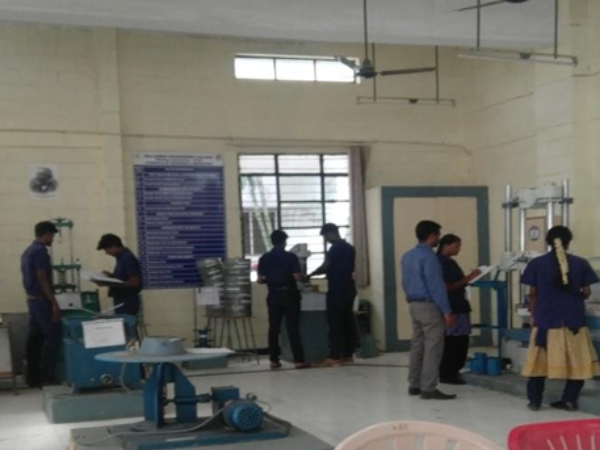
This lab is equipped with the major equipments like Universal Testing Machine, Torsion Testing machine, Beam Testing Apparatus, Rockwell Hardness Testing Machine, Brinell Hardness Testing Machine, Impact Testing Machine, Muffle Furnace and Minor equipments like Metallurgical microscopes, Vicat Apparatus, Le-Chatelier mould, Le-Chatelier Flask etc. Students gain the practical knowledge through these equipments with the help of the Lab manuals. Various tests related to the mechanical properties are conducted in this lab. This lab is utilized by both the civil and mechanical engineering students.
Computer Aided Design And Drafting Lab
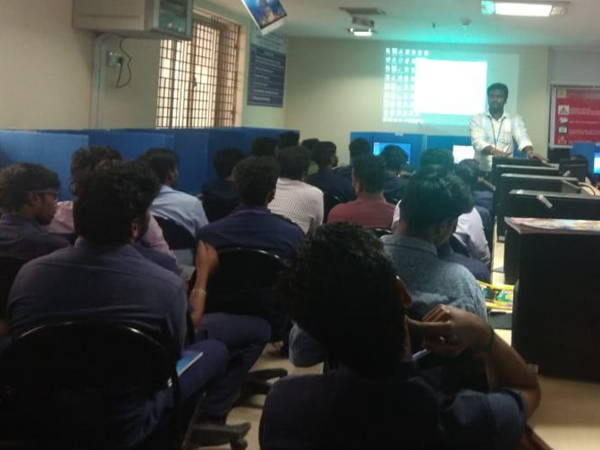
A well-equipped computer lab with advanced facilities is established for the benefit of the civil engineering students. High end terminals supported by latest hardware and software, latest visual aids, plotting devices, etc. are among them. Advanced civil engineering software are procured for making the students globally competitive and industry ready. At CAD lab, students get professional training on 2D & 3D drafting of civil engineering drawings using the latest version of AutoCAD software. Student will learn computer aided design layout and 3D solid modeling definition. Students will also gain the knowledge of design and drafting needed for civil engineering discipline.
Concrete And Highway Engineering Laboratory

This lab is to learn the principles and procedures of testing Concrete and Highway materials and to get hands on experience by conducting the tests and evolving inferences. This lab is equipped with major equipments Concrete mixer machine , Compression Testing Machine (200 T Capacity), Compaction Factor Apparatus, Aggregate impact testing machine, Vee – Bee Consistometer, Marshall Stability Testing Machine, Ductility Testing Machine, Bitumen Extractor (Electrical) .
Soil Mechanics Laboratory
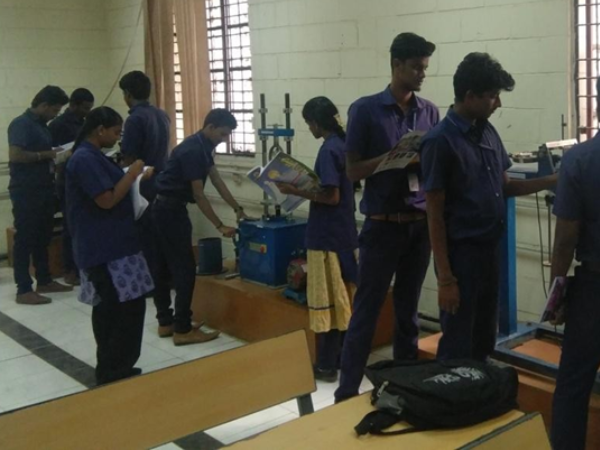
This lab helps the students attain adequate knowledge in assessing both Physical and Engineering behaviour of soils through laboratory testing procedures. This lab is equipped with major equipments like Direct Shear test Apparatus, Triaxial test Apparatus, CBR Apparatus, Consolidation Apparatus, Permeability Apparatus, Relative Density Apparatus, Field Density test Apparatus, Proctor Compaction test Apparatus. Students gain knowledge in differentiating and identifying suitable type of soil for different construction practices. The students learn to identify the Liquid limit, Plastic Limit, Shrinkage Limit, Specific gravity and particle size determination of different types of soil.
Survey Laboratory

Surveying takes the foremost place in planning, designing and execution of any kind of construction work. Moreover, knowledge in surveying plays a vital role in the professional practice of civil engineers and architects. Hence, the students are introduced to a course on surveying, provided with ample time and equipments to perform the field exercises on their own. The survey lab Consists of Total station, GPS, Electronic theodolite, Transit theodolite, dumpy levels, plane tables, compass etc.,
Engineering Practices Lab
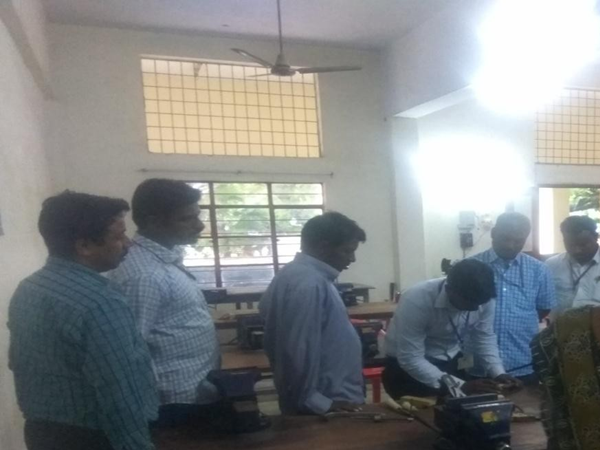
This lab is equipped with the major equipments like Bench vice, pipe vice and power tools for drilling and cutting. Students gain the practical knowledge through these equipments with the help of the Lab manuals. This lab is utilized by all the students enrolled in the college for lab classes and for projects also. By completion of this lab, the students will get an idea to solve the plumbing problems at minor level.
Advanced Stuctural Engineering Laboratory
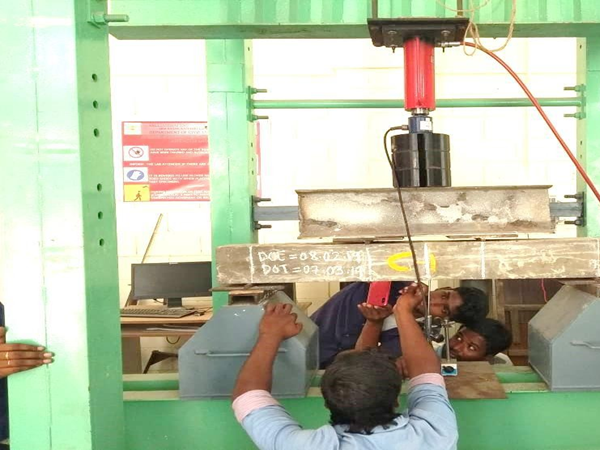
The Advanced Structural Engineering Laboratory is equipped with Loading frame of 50T capacity for both Horizontal and Vertical loading, Rebound Hammer, Ultrasonic Pulse Velocity Tester, Hydraulic Jack with 10T,20T,30T, Load cell with 7.5T,15T,30T With Indicator, Proving Ring, Strain Indicator, Hydraulic Crane (2T), Vibration Meter & Exciter-5N capacity. Structural Analysis experiments help the students to understand the practical behavior of the physical structures like beams, Slabs, Column etc. A proper structural analysis of these structures helps the students to solve the practical problems.
Project Model Lab
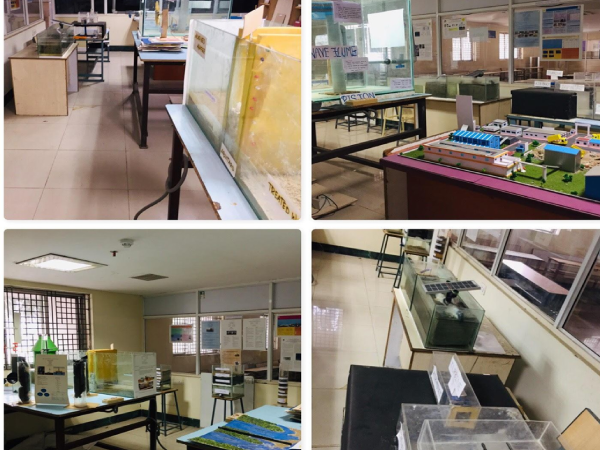
The best project model done by the students are exhibited in a model project lab with an intention to appreciate the students and also to motivate the upcoming junior students to do innovative projects.
Modern Material Museum
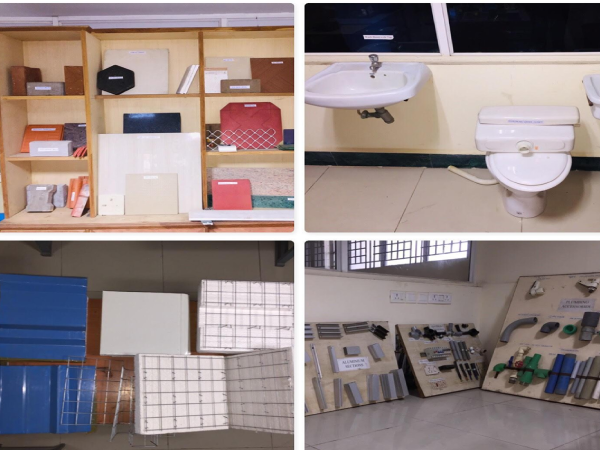
Comprehensive Material collection in various places where the students can explore, be inspired and gain in-depth knowledge of material characteristics and construction techniques.
Library
The Department library consist of 446 books which support our users by making the discovery of and access to high-quality resources and assist users in the application of information in their teaching, learning and research activity. Hand books and Thesis collections are also available for the purpose of Innovative projects.
Department Library
- No. of Books: 446
- No. of Project Reports: 450
Central Library
- No. of Titles: 1128
- No. of Volumes: 3574
- No. of National Journals: 12
- No. of International Journals: 12
- No. of E-Journals: 552
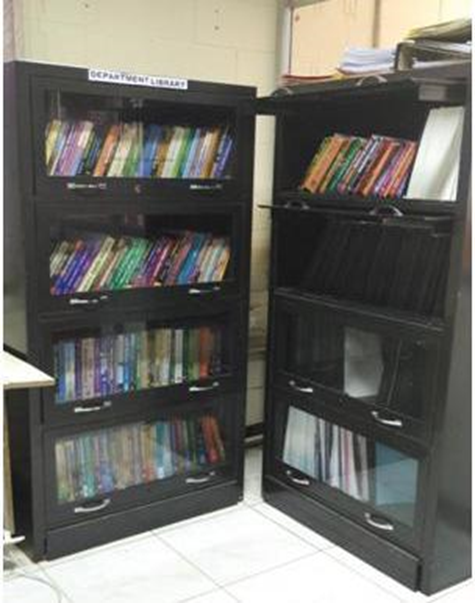
Events
Placement
Career Guidance
- The students are given wider exposure to apply for various courses in different universities.
- The students are trained to take up entrance exams for their higher studies. Procedures for applying to different universities are imparted.
- The faculty members of Placement and Training department guide the students throughout their period of study.
- The placement cell helps the students to complete their internship by placing them in various companies.
Placement details for the last 6 years
| Year | No. of Students Placed |
|---|---|
| 2021-2022 | 5 |
| 2020-2021 | 6 |
| 2019-2020 | 12 |
| 2018-2019 | 16 |
| 2017-2018 | 22 |
| 2016-2017 | 32 |
Academic Year: 2021-2022
| Sl.No. | Company Visited | Students Placed |
|---|---|---|
| 1 | Accenture | 2 |
| 2 | Cognizant (CTS) | 2 |
| 3 | Square Yards | 1 |
Academic Year: 2019-2020
| Sl.No. | Company Visited | Students Placed |
|---|---|---|
| 1 | Accenture | 7 |
| 2 | SysArc Informaix | 1 |
| 3 | Sutherland | 4 |
Academic Year: 2017-2018
| Sl.No. | Company Visited | Students Placed |
|---|---|---|
| 1 | Accenture | 5 |
| 2 | Kaar Technologies | 1 |
| 3 | CPLR softtech | 6 |
| 4 | Sutherland-Voice | 5 |
| 5 | VDart Software Services Pvt. Ltd | 1 |
| 6 | Paragon Digital Services | 2 |
| 7 | Indian Hume Pipe | 2 |
Academic Year: 2020-2021
| Sl.No. | Company Visited | Students Placed |
|---|---|---|
| 1 | Accenture | 1 |
| 2 | Wipro | 2 |
| 3 | Sutherland- Voice | 2 |
| 4 | Sutherland- Non-Voice | 1 |
Academic Year: 2018-2019
| Sl.No. | Company Visited | Students Placed |
|---|---|---|
| 1 | TCS | 2 |
| 2 | Valued Epistemics | 1 |
| 3 | Sutherland | 4 |
| 4 | Maestro Steel | 6 |
| 5 | Zuari Cements | 1 |
| 6 | Indian Hume Pipe | 2 |
Academic Year: 2016-2017
| Sl.No. | Company Visited | Students Placed |
|---|---|---|
| 1 | Accenture | 16 |
| 2 | Sutherland | 8 |
| 3 | Sutherland-Voice | 4 |
| 4 | Tech Mahindra | 2 |
| 5 | Disha Interiors | 2 |
Research
List Of Funds Received From Reputed Agencies
| S.NO | Title of the Project | Name of the Scheme | Name of the Funding Agency | Sanctioned Grant Amount (Rs.) | Duration |
|---|---|---|---|---|---|
| 1 | Entrepreneurship Awareness camp | DST-NIMAT | DST | 1,60,000 | 11.09. 17-13.09.18 |
| 2 | Modern Construction Materials and Construction Techniques | Faculty Induction/ Refresher Programme FIP | AICTE- ISTE | 3,00,000 | 21.05.18- 26.05.18 |
| 3 | Analytical and Experimental study on composite frames | Student project scheme | TNSCST | 10,000 | 1 Year |
| 4 | Recent Advances in Earthquake Resistant Design and Structural Dynamics | CSIR – National Seminar | CSIR | 50,000 | 16.02.17-17.02.17 |
| 5 | Performance Study on Steel Elliptical Hollow Stub Column | Student project scheme | TNSCST | 10,000 | 1 Year |
| 6 | Experimental Investigation on Behaviour of Glass Fibre Reinforced Polymer Concrete | Student project scheme | TNSCST | 10,000 | 1 Year |
| 7 | Faculty Development Training Programme on Railways, Airport and Harbour Engineering during | FDP Scheme | Anna University | 80,000 | 27.05.2013 -03.06.2013 |
| 8 | Experimental study on ECO-BLAC bricks. | Student project scheme under VEC management | VEC | 5,000 | 6 months |
| 9 | Experimental Study of Lime Concrete using Waste Materials | Student project scheme under VEC management | VEC | 5,000 | 6 months |
| 10 | Experimental Study on Automatic Drip irrigation using Solar Energy | Student project scheme under VEC management | VEC | 5,000 | 6 months |
| 10 | Study on Ductility Performance of Carbon Nanotubes in Basalt Reinforced Concrete Beams | TNSCST Under Student Project Scheme | TNSCST | 7,500 | 1 Year |
Contact
Dr. D. Elango
Professor & Head,
Dept. of Agriculture Engineering,
SRM Valliammai Engineering College,
SRM Nagar, Kattankulathur – 603 203,
Chengalpattu District,
Tamil Nadu, India.
MOBILE : +91 – 94440 50687
TEL : 044 – 27454784 / 726, EXTN : 8101
FAX : 044 – 2745 1504.
EMAIL : hod.civil@srmvalliammai.ac.in


